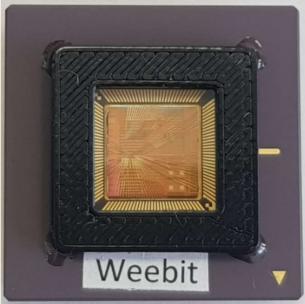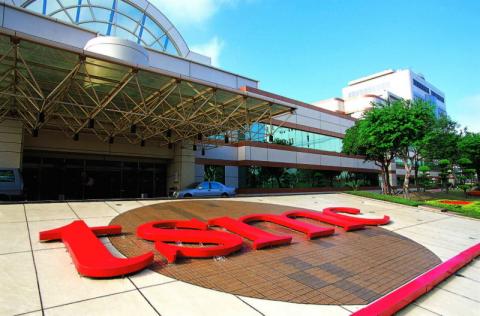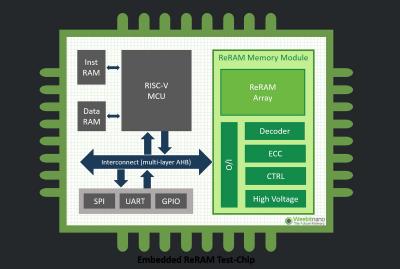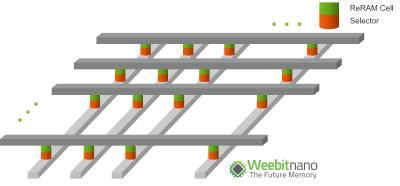Weebit Nano licenses its ReRAM technology to DB HiTek foundry
Israel-based RRAM developer Weebit Nano announced that it has signed a licensing agreement with DB HiTek, a Korean-based foundry (said to be one of the world's top 10 foundries). The commercial agreement includes technology transfer, qualification and licensing.
Under the agreement, DB HiTek has licensed Weebit ReRAM for its customers to integrate as embedded non-volatile memory. Weebit ReRAM technology will be available in DB HiTek’s 130nm Bipolar-CMOS-DMOS (BCD) process, which is used in analog, mixed-signal, and power designs in consumer, industrial and other IoT devices. DB HiTek also has the option to use Weebit ReRAM for other process nodes.
Weebit Nano raised $40 million to accelerate the commercialization of its RRAM technology
Israel-based RRAM developer Weebit Nano announced that it has secured $40 million USD in its latest financing round, meant to accelerate the development and commercial roll-out of its ReRAM technology.
The fund raising took part through the placements of 12 million new shares to international institutional investors, as well as an oversubscribed share purchase plan (SPP) to existing shareholders.
In early 2023 Weebit taped-out demonstration chips integrating its embedded RRAM module in an advanced 22nm FD-SOI process technology. In November 2022 the company announced that it has received the first silicon wafers from SkyWater Technology, with embedded Weebit RRAM.
Weebit Nano taped-out its first 22 nm demo RRAM chip
Israel-based RRAM developer Weebit Nano announced that it has taped-out (released to manufacturing) demonstration chips integrating its embedded RRAM module in an advanced 22nm FD-SOI (fully depleted silicon on insulator) process technology.

The company says that this is its first tape-out in 22 nm, one of the industry’s most common process nodes, and a geometry where embedded flash is not viable. Weebit worked with its development partners CEA-Leti and CEA-List to successfully scale its ReRAM technology down to 22nm.
Infineon to adopt TSMC's embedded RRAM in its next-gen Aurix microcontrollers
Infineon says that its next generation Aurix TC4x microcontrollers will adopt RRAM memory, instead of the traditional embedded flash. The company expects the first samples of such chips to ship to customers before the end of 2023.

Infineo's next-gen Aurix chips will be produced at Taiwan Semiconductor Manufacturing Co (TSMC), using its 28nm CMOS process. The company says that RRAM memory will be more energy efficient at 28nm compared to the currently-used embedded flash memories. The RRAM memory will also enable higher disturb immunity and it allows for bit-wise writing without need for erase, which allows for superior performance over embedded flash. The cycling endurance and data retention are comparable with flash.
Weebit Nano receives the first RRAM-enabled silicon wafers from SkyWater Technology
Israel-based RRAM developer Weebit Nano announced that it has received the silicon wafers from SkyWater Technology, with embedded Weebit RRAM. The company says this is an important step as its technology is now proven with standard tools and a mature process flow, which makes it easy for customers to dopt its technology.

The silicon SkyWater RRAM-enabled wafers will be sliced into chips, packaged, and then tested and qualified. The chips, which were manufactured in SkyWater’s 130nm CMOS process, will be used for customer demonstrations, testing and prototyping ahead of commercial orders and volume production, allowing customers to confidently start designing SoCs using these ReRAM modules.
Weebit Nano taped-out demonstration RRAM chips to SkyWater's foundry
Israel-based RRAM developer Weebit Nano has taped-out demonstration chips integrating its embedded ReRAM module to SkyWater Technology’s foundry. Weebit signed the agreement with SkyWater in September 2021 to transfer its technology to SkyWater's fab.

This is the first tape-out of Weebit's technology to a production fabrication. The technology will be available on SkyWater’s 130nm CMOS process, which is suitable for applications such as analog, power management, automotive, IoT and medical. Weebit says that its chips are designed with unique patent-pending analog and digital smart circuitry running smart algorithms, thereby significantly enhancing the memory array’s technical parameters
Weebit demonstrated its first operational crossbar RRAM array
Israel-based RRAM developer Weebit Nano announced that together with CEA-Leti iit has demonstrated its first operational crossbar arrays that combine its ReRAM technology with a selector.
Weebit says that that is is a key milestone on the company's path to creating standalone memory chips. The company's RRAM crossbar arrays were developed using a 1S1R (one selector one resistor) architecture to enable the higher density needed for discrete chips. Weebit's arrays can be stacked in 3D layers to deliver higher densities.
Weebit receives the first embedded RRAM silicon wafers for testing
Israel-based RRAM developer Weebit Nano announced that it has received from manufacturing the first silicon wafers that integrate its embedded ReRAM module inside complete subsystem demo chips.

These highly integrated chips will be used for testing, characterization and demonstration to potential customers. Weebit also updates that the transfer of the company's embedded ReRAM technology to SkyWater Technology's production fab is progressing on schedule.
Weebit Nano raised $25.7 million AUD to bring its RRAM technology to market
Israel-based RRAM developer Weebit Nano raised $25.7 million AUD from four Israeli institutional investment and pension funds. The company also announced a pro rata non-renounceable Entitlement Offer to raise a further $9 million AUD.

The company provided shares at $2.84 AUD per share, which represents a 11.5% discount to the last closing price on 8 November 2021.
Weebit Nano demonstrates its RRAM tech at 28 nm
Israel-based RRAM developer Weebit Nano announced that together with its partner CEA-Leti, it has demonstrated production-level parameters of its RRAM technology in a 28nm process.

The company says that it has tested, characterized and measured functional 1 Megabit (Mb) ReRAM arrays in a 28nm process technology on 300mm wafers. The testing demonstrated the robustness of Weebit's ReRAM technology with results showing very good endurance and data retention alongside other production-level quality parameters.
Pagination
- Previous page
- Page 2
- Next page

